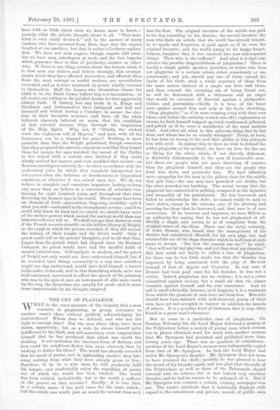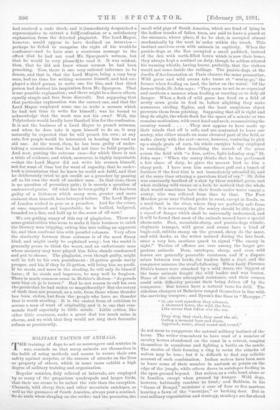THE CRY OF PLAGIARISM.
WHAT is the exact measure of the iniquity that a man commits in plagiarising, in giving utterance to another man's ideas without publicly acknowledging his indebtedness P Whom does he defraud, and who has the right to arraign him P Not the man whose ideas have been stolen, apparently; for, as a rule, he shows himself quite indifferent to the theft, and will sometimes even congratulate himself that he has produced that which was worth the Atealing. Is not imitation the sincerest form of flattery, and Low could his neighbour flatter him more sincerely than by wishing to father his ideas P The world has already accorded him his meed of praise, and in applauding another they take .away nothing from what they have already given to him ; therefore, if he be a wise man, he will prudently hold his tongue, and comfortably enjoy the repetition of praise -out of which the world has been tricked. The world has been tricked, undoubtedly, but is the world a sufferer or the poorer on that account P Hardly : it is true that, in a certain sense, it has paid twice for the same article ; but the article was worth just as much the second time as it was the first. The original inventor of the article was paid in his day according to his deserts ; the second inventor, the man who finds an article that the world has already bought, so to speak, and forgotten, is paid again as if he were the original inventor; and the world, owing to its happy forget- fulness, imagines that it has received two new and separate things. Then who is the sufferer P And what is it that con- stitutes the peculiar disgracefulness of plagiarism P There is hardly a single public speaker, preacher, or writer who does not plagiarise to a certain extent, either consciously or un- consciously; and yet, should any one of these extend the limits of his theft, steal a whole sequence of ideas from the same source instead of a single one here and there, and then commit the crowning sin of being found out, he will be denounced with a bitterness and an anger that would be excessive if directed against a pickpocket. Critics and journalists—chiefly, it is true, of the baser sort—gather around him and yelp at his heels, shrieking, 44 Stop, plagiarist!" as if he were running away with their own ideas ; and before the unlucky wretch can offer explanation or excuse, he finds himself tripped up, tried, condemned, pilloried, and pelted as if he were a malefactor of the most noxious kind. And after all, what is this grievous thing that he has done, and whom has he so cruelly wronged P Truly, at least, he has done no wrong to the mob that gibber at him and pelt him with mud. In saying this, we have no wish to defend the wilful plagiarist or his method; we have no love for the one or liking for the other, which, if not directly dishonest, is distinctly dishonourable in the eyes of honourable men : but there are people who are more deserving of censure than the plagiarist himself, and they are the people who hunt him down and persecute him. We have infinitely more sympathy for the man in the pillory than for the rabble that pelt him,—the one may have provoked our dislike, but the other provokes our loathing. The actual wrong that the plagiarist has committed is nothing compared to the injustice and inequality of his punishment. He has borrowed, and failed to acknowledge the debt ; he cannot really be said to have stolen, except in the extreme case of his altering and marring the ideas that he borrowed, and that case is of rare occurrence. If he borrows and improves, we have Milton as an authority for saying that he has not plagiarised at all. Hardly a single case occurs to us of complaint from the original owner of the ideas, There was the story, certainly, of John Dennis, who found that the management of his theatre had substituted Macbeth for his own play, but had retained the use of the stage thunder which he had been at such pains to invent. "See how the rascals use me !" he cried ; "they will not let my play run, and yet they steal my thunder." But that could not fairly be called a case of plagiarism, for there can be but little doubt but that the thunder was improved by being associated with the play of Macbeth instead of that of Appius and Virginius. In any case, if Dennis had been paid once for his thunder, he was not a victim. Indeed, plagiarism has no victims ; it is not a crime committed against society, but a small sin that the sinner commits against himself and his own conscience. And we call it small advisedly, because, as it happens, it is a weakness from which the greatest of men have not been free. Men who should have been satiated with well-deserved praise of their own, have yet not scrupled to borrow in addition the laurels of others. It is a peculiar kind of littleness that is very often found in a great man's character.
But to come to a particular case of plagiarism. On Sunday, February 8th, the Lord Mayor delivered a sermon at the Polytechnic before a society of young men, which sermon was in places identical, word for word, with another sermon that Mr. Spurgeon had preached and published more than twenty years ago. There was no question of coincidence : portions of the Lord Mayor's sermon were indisputably copied from that of Mr. Spurgeon, In fact, the Lord Mayor had stolen Mr. Spurgeon's thunder. Mr. Spurgeon does not seem to have resented the theft ; possibly he was pleased to hear the sound of his thunder again, and was glad that the walls of the Polytechnic as well as those of the Tabernacle should resound with its echoes,—for it was indeed very excellent thunder, and he had no reason to be ashamed of it. But if Mr. Spurgeon was content, a certain evening newspaper was not. The tender solicitude that it habitually displays with regard to the consciences and private morals of public men
had received a rude shock, and it [immediately despatched a representative to extract a fullconfeseion or a satisfactory explanation from the detected plagiarist. The Lord Mayor, however, would appear to have declined an interview— perhaps he failed to recognise the right of his would-be confessor—and to have sent a courteous message to the effect that he had not read Mr. Spurgeon's sermon, but that he would be very pleased.] to read it. It was evident, then, that he did not know whose sermon he had been preaching. Now, there is one very rational inference to be drawn, and that is, that the Lord Mayor, being a very busy man, had no time for writing sermons himself, and had em- ployed a third person to write one for him, and that third person had derived his inspiration from Mr. Spurgeon. That is one possible explanation ; and there might be a dozen others, equally simple and, free from discredit. But supposing that that particular explanation was the correct one, and that the Lord Mayor employed some one to write a sermon which he had not time to write for himself ; was he bound to acknowledge that the work was not his own P Well, the Polytechnic would hardly have thanked him for the confession. It is not the business of a Lord Mayor to preach sermons, and when he does take it upon himself to do so, it may naturally be expected that he will preach his own ; at any rate, few people would be interested in hearing him read an old one. At the worst, then, he has been guilty of under- taking a commission that he had not time to fulfil properly. And now, putting the extreme case—for which there is not a tittle of evidence, and which, moreover, is highly improbable that the Lord Mayor did not write his sermon himself, not for want of time but for want of capacity, that he under- took a commission that he knew he could not fulfil, and that he deliberately tried to get credit as a preacher by passing off as his own the work of another man. In that case, there is no question of pecuniary gain ; it is merely a question of undeserved praise. Of what has he been guilty ? He has been guilty of a littleness which many men, greater and more eminent than himself, have betrayed before. The Lord Mayor of London wished to pose as a preacher. And for the crime, at once unproved and improbable, he is bullied, badgered, branded as a liar, and held up to the scorn of all men !
We are getting weary of this cry of plagiarism. There are some genial critics who seem to make it their business to catch the literary man tripping, entrap him into telling an apparent lie, and then confront him with parallel columns. Very often the similarity between those columns is of the most flimsy kind, and might easily be explained away ; but the world is generally prone to think the worst, and an unfortunate man whose memory may have played him false, stands condemned and put to shame. The plagiarist, even though guilty, might well be left to his own. punishment : ill-gotten goods rarely prosper, and his, if they be ill-gotten, will bring him no profit. If he steals, and mars in the stealing, he will only do himself harm ; if he steals and improves, he may well be forgiven. There is mach common-sense in Moliare's dictum : "Jo prends mon Men oh je le tronve." Had he not reason to call his own the goods that be had stolen so magnificently? But the outcry of theft does not proceed, as a rule, from those whose thunder has been stolen, but from the people who have no thunder that is worth stealing. It is the easiest form of criticism to accuse a man of want of originality, and it is one that com- mends itself especially to little minds. Little critics, like other little creatures, make a great deal too much noise in chorus, and we wish that they would not sing their favourite refrain so persistently.







































 Previous page
Previous page